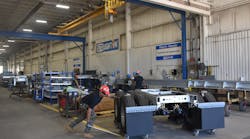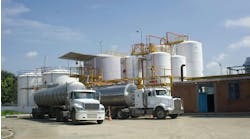Congressman calls Stoughton Trailers an 'inspiring example' in China trade war
STOUGHTON, Wisconsin—The House Select Committee on the Chinese Communist Party on Aug. 30 came to the heart of the Midwest—"far from the think tanks and D.C. where jobs and factories are often just numbers on a spreadsheet”—to build the case that the decline in U.S. manufacturing is less about economics and more about policy failures that let China-sponsored companies cheat the global fair-trade game.
Stoughton Trailers, which hosted the roundtable with committee leadership and a wide range of area manufacturers, was cited as an exemplar of the reshoring renaissance and a successful challenger to China’s strategic targeting of industries critical to the global supply chain.
“We have with [Stoughton Trailers President and CEO] Bob [Wahlin] and his team here an inspiring example of how American grit and determination can stand up to adversarial aggression from the CCP’s trade warfare,” said the committee's chairman, Rep. Mike Gallagher (R-Wis.).
See also: Trade commission finds cause in intermodal chassis dispute
Stoughton Trailers was among the several U.S. intermodal chassis manufacturers who successfully petitioned U.S. trade authorities in 2020 to penalize CIMC, a state-supported Chinese company, for the unfair trade practices that allowed CIMC to take over the domestic intermodal chassis market.
That hard-won victory could be short-lived, however.
“We were successfully able to get the tariff in place, but our Chinese competition has quickly shifted to other areas to work around the tariff,” Stoughton’s Wahlin said. “We’ve had relief for a little over two years, but China’s been avoiding those tariffs for about a year-and-a-half.”
‘Economic disease’
Gallagher convened the roundtable, held on the Stoughton manufacturing floor just in front a large robotic welding cell in full operation, recalling a conversation with Wahlin in his Green Bay-area district office.
“He laid out Stoughton’s story, and I was captivated by it,” Gallagher said. “Was there something we could do with the select committee to shine a light on that story and use it as a way to talk about these broader issues we face in terms of this competition between the U.S. and China?”
Those issues include “boarded-up factories, rusting steel mills, and laid-off friends and relatives,” he continued. The narrative, as explained by “politicians in Washington and bankers in New York,” has long been that the free market was “working its magic.”
“But the decline of American industry is not inevitable and never has been,” Gallagher said. “De-industrialization is a policy choice, and it's been the favored choice of both parties for far too long. But more than Democrats or Republicans, American de-industrialization has been the favored policy choice of the Chinese Communist Party in Beijing.”
The chairman then laid out the range of support China provides strategically selected industries, from free real estate and loans to a “total pass” on environmental standards and safety regulations. And, “most egregious,” a state-directed “espionage apparatus” is empowered “to coerce, hack, or steal” American intellectual property and trade secrets.
“Companies across America are competing against Chinese firms that often literally cannot go bankrupt or be underpriced,” he said. “In the case of Stoughton Trailers, their Chinese competitors were selling products into the U.S. for less than the cost of the raw materials that were used to produce them. That's not fair competition—that's an economic disease that's eaten away at the fabric of our communities here for decades.”
See also: Intermodal chassis tariff divides truckers, US manufacturers
The committee ranking member, Rep. Raja Krishnamoorthi (D-Ill.), played up the long-time sporting rivalry between his and Gallagher’s congressional districts.
“As a Bears fan it does feel like a diplomatic mission, coming up here to Packers country,” Krishnamoorthi quipped. “But if there's one thing that two NFL partisans can put aside their differences about, it is how do we stand up for American workers, how do we stand up for American companies like Stoughton Trailers, and how do we combat economic aggression from the Chinese Communist party?”
Continuing the sports analogy, Krishnamoorthi likened the decision to normalize trade with China in 2000 to adding an expansion team to the NFL.
“When you bring a new team into the league, there's an expectation that the team will play by the same rules: They'll have 11 players on the field, line up behind the line of scrimmage and follow the orders of the referee,” he said. “But the problem is the CCP never intended to follow the rules, and they've created an environment in which they regularly, unfairly have an advantage over their competitors.”
Krishnamoorthi cited a 2020 Economic Policy Institute study that reported more than 15,000 jobs had been displaced in his Illinois district alone because of unfair trade practices. To reverse these losses, U.S. policy first needs to enforce the rules of fair trade; second, encourage investment in American companies and workers “because we know American working men and women and companies can out-compete anyone if they're on a level playing field”; and, third, continue to build on the progress made with legislation such as the CHIPS and Science Act, supporting American semiconductor research and development, and the bipartisan Infrastructure Investment and Jobs Act.Fall and rise
In his opening testimony, Stoughton’s Wahlin was quick to support the lawmakers’ take.
“Purposeful unfair trade is a feature of the Chinese Communist Party's economic policy, and U.S. manufacturers like Stoughton suffer as a result,” Wahlin said.
In the early 2010s, Stoughton Trailers had been a leading supplier of 53-ft. shipping containers in the U.S., Wahlin explained, but China-supported CIMC was rapidly gaining share in the state’s attempt to “dominate” maritime equipment production and global shipping by selling products “far below” fair-market value.
Stoughton appealed, and the U.S. Department of Commerce agreed—but the International Trade Commission declined to impose penalties. Stoughton shut down container manufacturing operations. Chinese manufacturers now provide “nearly all” the shipping containers used the in the U.S. and more than 90% worldwide, Wahlin testified.
A similar challenge arose in the intermodal chassis trailer segment, as CIMC shipped components to CIMC U.S. assembly facilities and sold the finished units at prices that were often below the cost to produce them, Wahlin explained. This time, when the coalition of U.S. chassis builders petitioned the Commerce Department, ITC backed the finding that 44% of the CIMC value was subsidized, and assessed tariffs to compensate. The assessment will be reevaluated after five years.
See also: Strained supply chains prompt industrial nearshoring trends
“The benefits were immediate,” Wahlin said. “Prior to trade relief, only 5% of chassis registered for use in America were made here; last year, roughly 50% of registered chassis were made in the United States.
“Stoughton was able to make new investments into chassis production including a new facility in Waco, Texas, and we hired hundreds of new employees. More broadly, U.S. supply chains are now far less reliant on Chinese state-owned entities for vital transportation equipment.”
Looking ahead, Wahlin expressed confidence about the ability of domestic chassis production to compete after the evaluation period has run its course.
“We've been using this time to position ourselves to be successful if and when that tariff goes away. We do that through being more competitive, being more efficient,” he said, then pointed to the robotic welder. “Some of the equipment that you see behind us here is adding automation. It's not eliminating jobs but moving those people to build more trailers in other areas. It's creating more high-tech, more higher-paying jobs.
Stoughton’s strategy also includes adding automation to parts-build as well, and shifting from painting to galvanizing the chassis. As a result, Stoughton expects to reduce “all-in” labor costs to 15 to 20 hours per chassis.
“If we can achieve that, it doesn't matter where in the world that [competing products] are built: If they're using less expensive labor, that will not overcome the cost of transportation to get it to our market,” Wahlin said. “So if that's the case, then we can win. That's what we're trying to set up to do.
“My fear is that the plan only works if China doesn't dump, if they don't subsidize, so that is still a pretty significant threat to us.”
He also cautioned that China has begun skirting the tariffs by subsidizing chassis production in Thailand—a strategy used in other in industries impacted by trade restrictions with China. Wahlin encouraged support of the Leveling the Playing Field 2.0 Act, which would update U.S. trade remedy law to establish the new concept of “successive investigations,” to curb circumvention efforts from bad actors designed to undercut our domestic industries and increase market share.
“At Stoughton, we believe that American workers and American products are the best in the world—our trailers can stand up against any competitor when we have a level playing field,” Wahlin said. “But we cannot compete against the full weight of the government of China.”
Innovation wins
Responding to a panelist who suggested that the U.S. could never “out-subsidize” China, Gallagher noted that the U.S. can and should work with its allies to balance the scope of China’s economic might and to push back against “a common threat.” He also offered a straightforward analysis.
“Our secret sauce is innovation,” he said. “We’ve got a bunch of flexible, free-thinking people in America that like to take big risks in a way that’s not the same anywhere else. We have to double down on that.”
Krishnamoorthi echoed the suggestion.
“We have something so precious in this country which the CCP hates: freedom,” he said. “It’s so bad right now—the squelching of freedoms by the Chinese Communist Party—that their economy is in a tailspin as we speak.”
In concluding, Gallagher emphasized that the meeting had been bipartisan and collegial, featuring industry and labor as well as century-old traditional heavy industry and 21st-century hi-tech, and that such discussions “send a powerful message” to China.
Indeed, the roundtable met a day after Gallagher’s op-ed, “Americans are unwittingly financing the CCP. It has to stop.” was published in The Washington Post.
Taking in the Stoughton facility, the chairman added that it “just gives me hope for just the power of manufacturing in Wisconsin and the Midwest more broadly.”
He also noted that while the select committee spends a lot of time on “next-generation cool, sexy technology like AI and solar power,” he expressed a renewed appreciation for essential transportation equipment.
“Now I think chassis are sexy,” he concluded. “All of the goods we buy get shipped on containers that sit on chassis so, when you buy Christmas gifts for your kids, you're relying on the hard work that happens here. For our economy to function day-to-day, you're relying on the hard work of the men and women in this facility.
“You have our backs, and so it's important that we have yours in terms of what we do from the federal level.”







